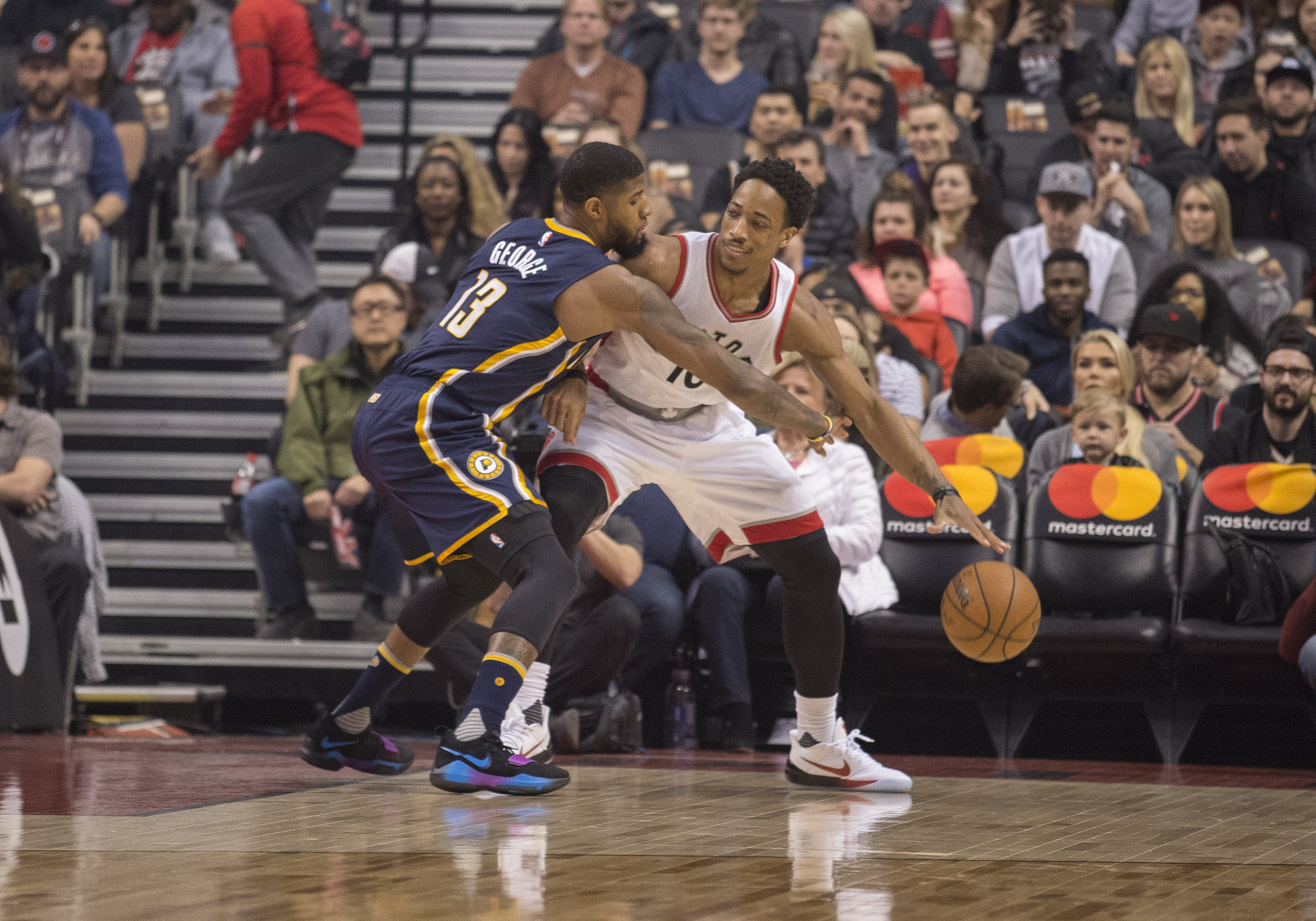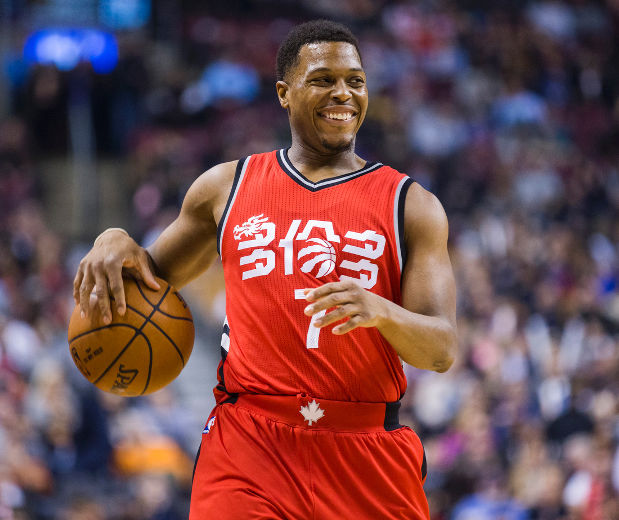Raptors 116, Pacers 91 | Box Score | Quick Reaction | Reaction Podcast
With the rumble down to just three, The Raptor squared up opposite an apparent two-on-one disadvantage. As the three mascots stared each other down, The Raptor made a quick lunge to his left, clotheslining one of his remaining opponents over the top rope. That’s when things got strange: The hometown favorite, presumably a babyface and the mascot the Air Canada Centre crowd was supposed to be rooting for, procured a chair, using the foreign object to lay out the last of his opposition, and dumped him over the top and to the floor.
The Raptor had won the Mascot Royal Rumble and was standing tall in the inflatable ring at half court, but at what cost? He’d turned his back on his morals. He’d blurred the lines. He’d downright cheated. The crowd still cheered, answering their cue, but the sense of hesitation was palpable. Humans – and mascots – don’t exist in the black and white, and we’re all defined by any number of fluid shades of grey, I understand. But to do this, in front of Stripes, his protege still struggling to cut his teeth as a curtain-jerking jobber, no less. And to be clear, this was no momentary lapse in judgment – a Dance Pak member had distracted Grizz earlier in the match, leading to his elimination. This was obviously a coordinated effort on the part of the Jurassic stable.
The impact of this decision – the crowd reactions, the effect on the impressionable Stripes, the marketability of The Raptor, not to mention the title shot he earns with the win – stands to be far-reaching.
Wait. Sorry. You probably care not for the outcome of the halftime mascot wrestling match. But look at this and tell me it wasn’t every bit as entertaining as the Toronto Raptors’ 116-91 victory over the Indiana Pacers on Sunday.
!!! pic.twitter.com/kAOWltaKva
— Blake Murphy (@BlakeMurphyODC) March 19, 2017
And that win was plenty entertaining, though the real Raptors required no nefarious means to secure the victory.
When the Raptors found themselves at a loss to explain their dearth of energy following Thursday’s embarrassing defeat, what lied at the heart of those players-only-meeting comments was that they didn’t have a great explanation for their occasionally shaky play outside of that. Effort is the low-hanging fruit, something that shouldn’t slump and never takes a night off due to variance. On Friday, they figured that aspect out, grinding out a try-hard victory over the Pistons to right the ship and build some equity to continue to build with.
What Sunday provided was a glimpse of what can follow when actually playing better accompanies the uptick in effort. It was an enjoyable, aesthetically pleasing, buzzer-to-buzzer victory, the type of which the Raptors have had very few since things went awry in late December. Friday’s energy was apparent from the opening tip, the team clearly heeding head coach Dwane Casey’s warning to take care of home court rather than assuming it would take care of you and build momentum on your behalf, and the crowd responded in kind with boisterous chants early and often. The explosion when Delon Wright threw down a dunk off of a turnover in the fourth to push the lead to 18 wasn’t the stuff of Norman Powell last spring, but it was plenty buzzy for a Sunday in mid-March. (When P.J. Tucker followed it by drawing a charge on Paul George, George’s fifth foul on a bad night, it was surprising there wasn’t an on-court lineup for daps and hugs.)
And again, the Raptors actually played well, freed of the recent shackles of poor shooting and grimy, late-clock heaves born of incessant dribbling and plan-less passing around the perimeter. That the Raptors have struggled to create beautiful offense is not surprising, nor is it entirely their fault given the absence of their best playmaker and 3-point shooter. But they’re capable of more than they’ve sometimes shown, and Sunday’s offense was something closer to their ideal.
Most notably, the ball moved exceptionally well on Sunday, with the Raptors tallying 25 assists – their most since December – on 45 field goals. That included a clear and concerted effort to pass freely early, with six of the team’s first seven field goals coming from an assist, as well as Jonas Valanciunas’ first trip to the free-throw line. The Raptors are never going to be a fully democratic offense, but their early season claims of the ball gaining a certain ethereal energy when passes beget baskets was lent credence here.
“It was good,” Cory Joseph said. “We were playing for each other, playing hard, playing together, making the extra pass, and guys were knocking down the open shot.”
Touch-to-touch became infectious, and the Raptors unleashed some fun wrinkles to pet plays, trusted their own shots immediately off of passes rather than second-guessing, and really did well identifying the screener after separation.
That helped Jakob Poeltl, in particular, have a strong showing. The rookie finished with 12 points and seven rebounds in support of Valanciunas’ quick-work 11-point, 13-rebound double-double that helped assert the team’s energy early, and Poeltl was able to flash his soft hands on the dive and terrific instincts as a defender. The Raptor bigs firmly outplayed Indiana’s, locking up Myles Turner and securing an enormous edge on the glass. Poeltl thinks the game far better than most rookie bigs, and while he’s going to be susceptible to getting bullied by bulkier centers, he continues to use his length, savvy, and hands well at both ends of the floor. As friend of the site and best-guitarist-in-the-world Steve Sladkowski put it, Poeltl is at the same time the most boring and most exciting rookie in the world. (Okay, his big block on Monta Ellis midway through the fourth was firmly on the “exciting” camp.)
“That’s okay,” Poeltl said of the one knock on him, his penchant for fouls that may not get called on a more experienced player. “That’s just part of the journey. As long as it’s not a deciding play I’m okay with it.”
The strong passing helped Toronto’s shooters, too, who were on the right end of regression in this one. The team’s been cold around the arc for weeks, a nod to their relative lack of shooting with Lowry out and Terrence Ross firing up shots in Orlando. They are not as bad as they have shown, though, and Patrick Patterson and DeMarre Carroll, in particular, were liable to round out of their respective slumps. The Raptors shot 12-of-27 from long-range in this one, with Cory Joseph tallying nine assists, four of them leading to threes. The gambler’s fallacy warns against assuming a hot streak will follow a cold, but it’s at least a reminder that some of these players have hit threes regularly in the past, an important consideration for sustained success over the next couple of weeks.
“Any time you play with the force we played with tonight – that’s what we’ve been searching for and we got that – it gives your offence and your defence, a chance to be successful,” Casey said.
Of course, the Raptors will tell you this was about the defensive side of the ball as much as it was their offense. And that’s not incorrect – their offense often started off of stops, something the team’s given a lot of lip-service too of late. Indiana scoring 91 looks a certain way, and that came on just 95.4 points per-100 possessions. Indiana shot just 41.3 percent from the floor and hit but six triples, and Toronto took care of misses with an 18-rebound edge. They also turned turnovers into 20 points the other way, a nice byproduct of their switchier lineup looks. All told, the Raptors have ticked up to 11th in defensive efficiency on the season, and they rank third since the All-Star break. That’s not a typo. Third.
Casey trusted the all-bench unit he’s used late in the first and third and early in the second and fourth of late, and you’re not going to believe this about a Toronto-Indiana game, but all-bench units played a role in the outcome. Toronto’s hockey-substitution second-line can’t really score, short on creators, but they can defend like all hell and did so here when Indiana matched with a starter-less group. In eight minutes, that second unit played to a plus-1, about as well as you can hope for a starter-less group. (Sure, opposing coaches have helped by playing equally limited bench units against them, and they’re still a minus-22.4 net rating on the year, but it’s nice that the group can keep up – and even pick up – the defense.)
That the bench took care of things led to some nice secondary benefits here, too. DeMar DeRozan was tasked with just 29 minutes of action, and no Raptor played more than 31. DeRozan was his usual strong self in that run, scoring 22 points and moving the ball really well. He also turned in another really solid defensive effort. That it’s taken this long to mention him speaks to the team-wide performance level, not anything he failed to do. He remains a veritable hero with Lowry shelved. Serge Ibaka had a really strong showing and was able to be capped at just 24 minutes, too. Not a single Raptor who played rotation minutes played poorly, really, and there are at least eight names you could point to as having turned in strong performances. The bench emptied with several minutes left in the game, getting the youngsters, including Lucas Nogueira, some run, which is always a nice cherry on a strong performance.
“We know that we’re better than what we did against OKC,” Norman Powell said. “We were just focused on bouncing back in Detroit and getting this win here. The whole vibe, talking to everybody, was just we’re gonna lock in on defense no matter what, no matter how we’re feeling, whether the offense is going or not.”
They did that, the offense got going, and the feeling seems to be a pretty positive one after taking two in a row following one of the worst losses of the season. As far as responses go, it’s hard to ask for more. The new-found resolve will surely be tested Tuesday when the Chicago Bulls Weird Voodoo Raptors Magic Machine visits.




